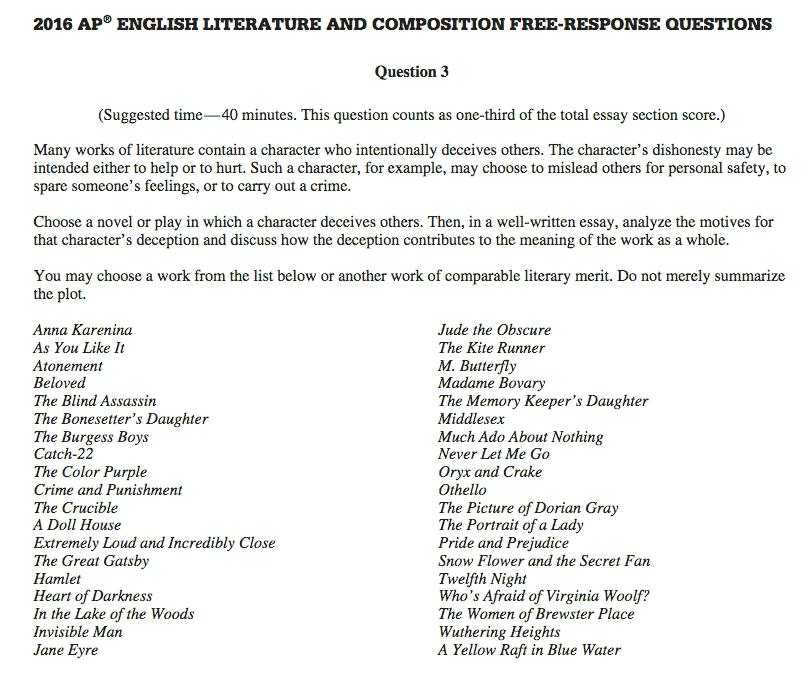Thinking about taking an AP English class in high school? Not sure about the differences between AP Language and Composition and AP Literature? Want to know the differences between the two AP English classes and the two AP English tests? This is the article for you! Here, I’ll explain what to expect in an AP Language and Composition class, as well as what to expect in an AP Literature class. I’ll also discuss what to expect on the AP Language and Composition Test and the AP Literature Test! Let’s go!
AP Language and Composition and AP Literature
Typically, AP Language and Composition and AP Literature are offered as a sequence. Most commonly, students take AP Language and Composition in their 11th grade (junior) year, then move on to take AP Literature in their 12th grade (senior) year. This is not always the case, though, so check your high school’s specific policy and course requirements. In general, AP Language and Composition is taken by a more diverse array of students, while AP Literature is popular with students who will go on to major in English or the arts and humanities. Of course, plenty of future physics majors like to challenge themselves with AP Literature as well!
Is AP Language or AP Literature harder?
Many students ask me whether the AP Language test or the AP Literature test is harder. Different students may find different tests harder, but in general, the AP Literature test is harder. It requires students to take a deeper look into specific texts, touching not only on their rhetoric and composition, but also on their themes, goals, and philosophical implications. BOTH tests, however, have very low pass rates, and VERY low 5 rates. Why is this the case? Most likely, it’s because the AP Language and Composition test is the #1 most common AP test taken by high school students. This means that a wide range of students, not just English buffs, take the test. As a result, the average score is lower than it would be for a test among only strong English students.
Similarities between AP Language and AP Literature
First, let’s take a look at what AP Language and AP Literature share in common:
Both AP Language and Composition and AP Literature have tests with a similar format.
On both AP English tests, the first section has around 55 multiple-choice questions. This section counts toward 45% of your total score. (The rest of your AP score will come from your essays.) The multiple-choice questions on both AP English tests gauge your ability to read, interpret, and analyze various passages and excerpts from novels, essays, plays, and so on. AP Language and Composition multiple-choice questions often center around rhetorical devices and strategies, structure, tone, and register. The AP Language test places a greater emphasis on literary devices, character development, and questions of theme and writer’s intent. Both the AP Language test and the AP Literature test will require you to answer questions on comprehension: with respect to both tests, therefore, it’s important to be able to quickly read and understand passages.
On both exams, the second section is the essay section, which accounts for the remaining 55% of your score. Each exam contains 3 essay questions. It’s important to be able to a) budget your time wisely, b) read, write, and think quickly, and c) write well, with insight. On both the AP Language test and the AP literature test, you must complete 3 essays in 2 hours (the test suggests you spend approximately 40 minutes working on each essay.)
An important difference between the tests is that the AP Language exam gives you a 15-minute reading period before you begin your essays, to allow time for you to formulate a response to the synthesis question, which asks you to consider and utilize several sources to formulate an argument.
Differences between AP Language and AP Literature classes
Although both the AP Language and the AP Literature class are designed to prepare students for introductory college-level English courses, the two AP classes differ in certain aspects. Both classes require you to read, write, and analyze various texts and works of literature. However, the AP Language course covers a wider range of material and is centered on rhetoric, while the AP literature course centers around fiction and poetry and is narrower in focus.
AP Language and Composition
The AP Language and Composition course is chiefly centered around nonfiction works–essays, articles, memoirs, and the like. Students taking AP Language will be asked to consider questions of rhetoric, structure, and argument in a variety of texts. The course asks students to do a fair amount of writing on these subjects. The essay questions on the AP Language exam aim to test your facility in close reading, comprehension, and analyzing an argument. The synthesis essay question requires you to consider several sources and draw upon those sources to formulate an argument of your own, while the rhetorical analysis essay asks you to read a text and consider how the author builds his or her argument by using rhetorical devices. There is also an argumentative essay task on the AP Language test.
AP Language and Composition teaches students skills that are useful not only for future English majors, but also for majors in ALL disciplines. No matter what you study, you’re going to be reading, thinking, and held responsible for articulating your ideas.
AP Literature
As I mentioned, the AP Literature exam is narrower in focus than the AP Language exam. In the AP Literature course, students are required to read, write, and think about literary works and poetry, considering questions such as character development, theme, structure, and the use of literary devices. There’s a bit more reading to do in an AP Literature course, generally speaking. Expect to read a variety of novels, short stories, plays, and poetry. Writing for the AP Literature course is chiefly analytical. You might be required, for example, to analyze a certain character, or explore how a work of literature gestures toward a theme by citing text and offering critical commentary on it.
The AP Literature essay questions are as follows: first, you will analyze a poem. In addition to theme, it’s important to understand questions of form, content, imagery, symbolism, rhetorical and literary devices, etc. Next, you’ll analyze a work of prose. And finally, you’ll be required to write what’s called the free response question, which most students consider to be the most difficult question. The free-response question asks you to choose a specific piece of literature from a list that it provides you and write an essay on the work. You do NOT have any information to help you, so it’s vital that you’ve read and are prepared to write about a wide range of literature.

Here’s the 2016 free response question’s prompt. Scary, isn’t it? You’ll be fine. Some students memorize quotations from a variety of novels and plays, but this isn’t necessary if you’re a skilled writer who can demonstrate a thoughtful and thorough understanding of the plot, character, theme, and language of the piece.
The takeaway
For most students, AP Language and Composition is a good choice. For students with a genuine interest in and passion for English, the AP Literature class is a great choice. The tests are quite similar, and both classes require a good deal of reading and writing. Both tests have LOW pass rates and LOW 5 rates, so it’s wise to work with a tutor who’s passionate about English literature! (I got a perfect 5 on both exams.) Let us know if you need some help with AP English!
* * *
That’s it! For more information on the English AP tests, as well as on the SAT and ACT, check out the rest of our blog. Looking for 1-on-1 test prep tutoring or small group classes? Let us know how we can help!
